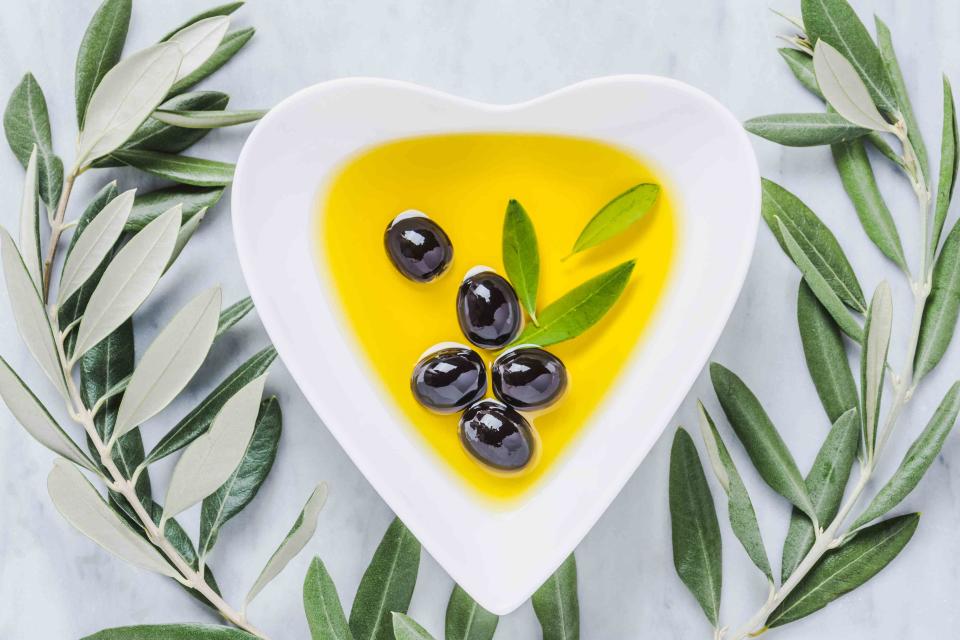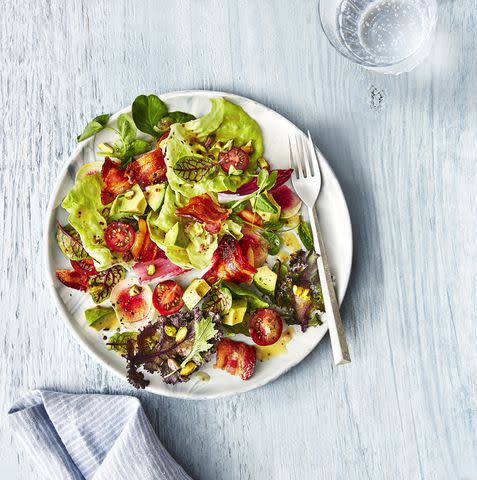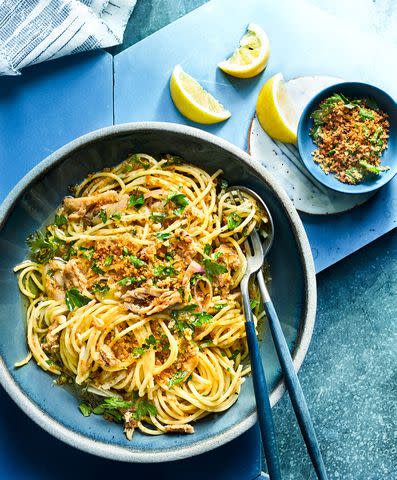The 4 Healthiest Reasons to Start Drizzling Olive Oil on Everything
Good-quality olive oil—especially extra-virgin olive oil—couldn't boast more benefits if it tried.

Leo Nori/Getty Images
Whether you’re garnishing a soup or dressing a salad, olive oil is one of those ingredients that makes everything taste delicious. It’s as perfect for frying, so long as you’re using high-quality olive oil for cooking. (But here's why it’s about to get more expensive!)
However, olive oil is more than just a marinade, dressing, or cooking agent; it’s teeming with vital nutrients and compounds too. In fact, enjoyed in moderation (a serving is about one tablespoon of oil), olive oil is one of the cornerstone ingredients of much-praised healthy eating plans like the Mediterranean diet, and is generally considered to be one of the best foods for longevity you can find.
What exactly does olive oil have to offer that makes it a full-fledged superfood? Dietitians break down the most noteworthy olive oil health benefits, from anti-inflammatory properties to heart-healthy fat.
Related:This Is the Freshest, Healthiest Type of Extra Virgin Olive Oil—but It's Only Available in Winter
Health Benefits of Olive Oil
Olive oil is packed in antioxidants.
Adding olive oil to your food is a delicious way to fuel up on antioxidants. According to registered dietitian Maddie Pasquariello, MS, RDN, olive oil contains potent antioxidants like flavonoids, oleuropein, and hydroxytyrosol—collectively known as phenolic compounds. “Antioxidants are a powerful part of the body’s defense system, helping to neutralize free radicals and protect your cells from damage,” Pasquariello explains. Free radicals are molecules that, when present in high levels, can lead to oxidative stress, a major factor in the development of chronic diseases like cancer and type 2 diabetes. Eating a diet rich in antioxidants is a smart way to protect your body from the impacts of oxidative stress.
Olive oil helps reduce inflammation.
As the phenolic compounds in olive oil fight oxidative stress, they also decrease inflammation—because oxidative stress can cause significant inflammation (and vice versa), according to Pasquariello. “Olive oil—specifically, extra-virgin olive oil—also contains unsaturated fatty acids, which decrease [inflammation],” she says. This is because extra-virgin olive oils undergo minimal processing, refinement, or purification.
The main fat in olive oil is oleic acid, which inhibits cytokines (proteins that trigger inflammation in the body) and suppresses stress pathways that activate pro-inflammatory compounds. These anti-inflammatory effects are “noteworthy for overall health because inflammation is associated with many chronic diseases, such as diabetes, heart disease, and obesity,” says registered dietitian Kristen Carli, MS, RD.
Related:7 Anti-Inflammatory Foods to Eat Every Day for Long-Term Health
Olive oil has healthy fats that lower blood cholesterol.
Particularly when used in place of saturated fat, olive oil can help keep your blood cholesterol in check. (Refresher: Saturated fats are those that are solid at room temperature, like lard, butter, and palm oil. Here’s more explanation about the different types of fat.)
“Simply adding more olive oil to your diet isn’t necessarily going to lower your cholesterol, but if you already consume a diet high in saturated fatty acids, substituting unsaturated fatty acids found in foods like olive oil [is] a good start,” Pasquariello says. (It’s also worth noting that managing cholesterol through food extends beyond the switch to olive oil, as foods like vegetables and lean protein are just as impactful.)
All that said, the cholesterol-lowering benefit of olive oil is pretty darn impressive. According to Pasquariello, the unsaturated fats in olive oil can lower LDL (“bad”) cholesterol while improving HDL (“good”) cholesterol. The latter “scavenges the body for any ‘free’ cholesterol to flush it out of the body, thus lowering [your] overall blood cholesterol,” she explains. This is key because high cholesterol is a major risk factor for heart disease, but replacing saturated fats—found in animal-based foods—with olive oil (and eating other heart-healthy foods) can help reduce the risk.
Related:5 All-Star Foods That Are High in Healthy Fats
Olive oil supports immune function.
Thanks to its high level of phenolic compounds, olive oil is an excellent food to eat for a strong, healthy immune system. Phenolic compounds support the production of white blood cells, the immune cells that help control inflammation in the body, Carli says. These cells are also responsible for scavenging and fighting disease-causing germs, further keeping you healthy. Plus, olive oil is an excellent source of vitamin E, an essential nutrient and antioxidant that supports and improves immune function.
Related:The Little-Known Secret to Keeping Your Olive Oil Fresh
Olive Oil Recipes and Ideas
Go-To Vinaigrette

5-Minute Hummus

Lemon Spaghetti With Sardines and Bread Crumbs

Universal Pesto

Nectarine Olive Oil Cake

For more Real Simple news, make sure to sign up for our newsletter!
Read the original article on Real Simple.

